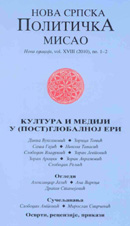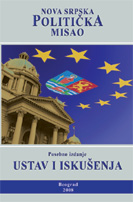| NSPM in English | |||
Facing the Facts on Terror |
 |
 |
 |
| петак, 01. август 2008. | |
|
But ally does not translate into surrogate. And U.S. frustration with Iraq and Pakistan has emerged, in part, because Iraqis and Pakistanis are not prepared to make all of America’s enemies their own. For good reason, Gilani and Pakistan’s military establishment, and Prime Minister Nouri al-Maliki’s government and the Sunni “Sons of Iraq”—all are prepared to ally with Washington against al-Qaeda—but an al-Qaeda defined in limited terms as the bin Laden/Zawahiri organization. After all, al-Qaeda has some nasty habits—and has not hesitated to display them even to sympathetic Sunni. Tribal leaders who initially welcomed the group found, over time, their own authority and prerogatives under attack—and discovered that these warriors of the faith were just as willing to strike at them in addition to the “infidels.” And al-Qaeda and its affiliates have demonstrated that they are perfectly willing to sacrifice the lives and well-being of those who live within “the base”—whether in Afghanistan, Pakistan or Mesopotamia—to further their own goals. It hasn’t escaped Pakistani intelligence analysts that, had Osama bin Laden not struck the United States on 9/11, the Taliban would continue to be ruling over most of Afghanistan and Pakistan’s position in that country would be largely unassailable. Sunni in central Iraq who hoped that al-Qaeda in Iraq would be their ticket to returning to positions of prominence and power in post-Saddam Iraq discovered otherwise—while the group’s militantly anti-Shia stance and bloody attacks on Shia civilians galvanized a sectarian response and strengthened the influence of Iran. And it is patently obvious why Iraqi Shia would want to take the fight to al-Qaeda. But a fight against a more generalized “Islamic radicalism” is not in the cards. The government in Baghdad is happy to fight Sunni radicals, and may even welcome American aid to lessen the need to continue to depend on Iranian support for solidifying its position within Iraq. But to join in with Washington so the United States can put meaningful pressure on Iran, in the name of fighting terrorism? That’s not going to happen. Attempts to prove an Iran–al-Qaeda link don’t carry much weight with al-Maliki and his team. For their part, the “Sons of Iraq” have been prepared to accept American payments to organize and to drive out from their provinces al-Qaeda elements and “foreign fighters.” Unlike the Baghdad government, these Sunni are quite leery of Tehran—and want to combat its influence in Iraq. But this is not out of any sense of solidarity with the “war on terror”—it is to regain the initiative and to at least establish Sunni self-rule in those parts of Iraq where they form the majority. And neither Shia nor Sunni in Iraq are prepared to broaden their anti–al-Qaeda stand by coming out against Arab Islamist groups which oppose Israel. Iraqis may come out to fight against al-Qaeda, but don’t expect meaningful action or even denunciations of groups such as Hezbollah, whose star has risen high among both Sunni and Shia since the 2006 conflict with Israel. The Pakistani establishment has tried to walk a tightrope—focusing efforts on dealing with al-Qaeda—meaning the cells that target Western countries, staffed by “outsiders.” But they are not prepared to write off the Taliban altogether, as well as the jihadi groups that continue to be active in Kashmir. Fearing Indian “encirclement,” Islamabad is not going to abandon potential clients, especially given the Indian “tilt” of Hamid Karzai’s government in Kabul. Reports from the region consistently point to continued assistance from Pakistan’s intelligence services to militants, notably Jalaluddin Haqqani, who is widely believed to be responsible for the attack on the Indian embassy in Afghanistan last month. This has led some U.S. analysts to conclude that Pakistan’s intelligence and military establishment is actively sabotaging Washington’s attempts to eliminate militant groups. The desire of many in the region to limit their cooperation with the United States to fighting one specific organization—al-Qaeda—rather than joining in broader efforts to “drain the swamp”—raises a real challenge for U.S. policy. “Indigenous allies” are critical if America is to be able to penetrate regions and networks that have proven difficult for outsiders to navigate. But these partners have their limits. The challenge for the next president is whether or not Washington is prepared to shift its emphasis, from “draining” to “containing” the swamps. If, as Peter Bergen and other terrorism experts suggest, there are still cadres in Western countries looking for support, guidance and material from sanctuaries such as the Pakistani tribal areas—and if there are limits to what the local militaries are prepared to do—and the United States is not prepared to countenance renewed long-term occupations of such sanctuary areas, then what options are open? Would the U.S. settle for enforceable agreements based on the September 2006 North Waziristan peace pact? To some extent, this is what has evolved in the Sunni areas of Iraq—a bargain that in return for eliminating al-Qaeda installations and driving out their personnel, the Sunni are to be left alone to run their own affairs. Perhaps a renewed effort in Pakistan to get provisions of agreements with various tribal regions that stipulate “no cross-border infiltration” and call for all foreign elements to be expelled is the way forward. Ever since the battle at Tora Bora in December 2001, it has been clear that America’s regional partners in the fight against “Islamic-inspired” terrorism had their limits; they were not going to fight and die for U.S. objectives. The aid we receive is indispensable but flawed. We can either learn to live with that gap—or fill it ourselves. Nikolas Gvosdev, a professor at the Naval War College, is a senior editor at The National Interest. The views expressed here are entirely his own. 01.08. 2008 The National Interest
|
Од истог аутора
- Russia’s Foreign Policy: What’s Next?
- Turning Russia into a Euro-Atlantic Stakeholder
- Engaging the Southern Democracies
- Shaping the Multipolar World
- The Realist Prism: The Ukraine That Might Have Been
- What the United States Can Learn From the Soviet War in Afghanistan
- The Realist Prism: Horse Trading with Beijing
- Resetting Russia
- Reagan Plagiarized
- Moving NATO Forward
Остали чланци у рубрици
- Playing With Fire in Ukraine
- Kosovo as a res extra commercium and the alchemy of colonization
- The Balkans XX years after NATO aggression: the case of the Republic of Srpska – past, present and future
- Из архиве - Remarks Before the Foreign Affairs Committee of the European Parliament
- Dysfunction in the Balkans - Can the Post-Yugoslav Settlement Survive?
- Serbia’s latest would-be savior is a modernizer, a strongman - or both
- Why the Ukraine Crisis Is the West’s Fault
- The Ghosts of World War I Circle over Ukraine
- Nato's action plan in Ukraine is right out of Dr Strangelove
- Why Yanukovych Said No to Europe

.jpg)






















